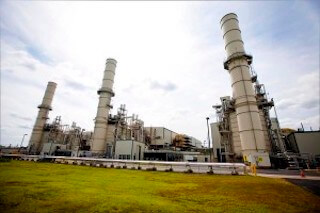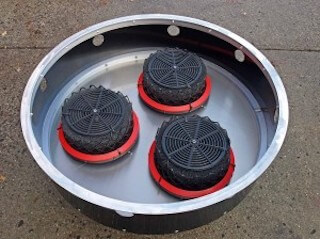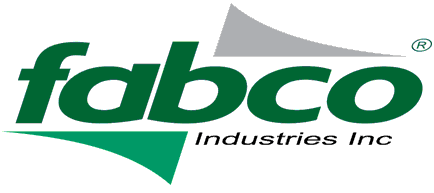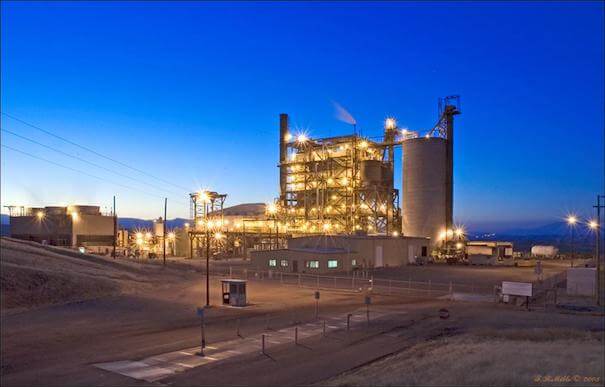Fabco Industries has recently been awarded a major decentralized stormwater retrofit project by a large East coast energy supplier. This project is an extension of a successful collaboration that has endured for over 10 years, as Fabco StormBasin™ and StormSack™ units have been installed at the company’s other locations throughout the region. Excellent product performance and dependable customer service have led to a solid working relationship, resulting in the installation of an additional 90+ StormBasin™ and StormPod™ filtering units as a decentralized stormwater treatment approach..

This latest project is on a site that has been in use for nearly 100 years and stretches over 250 acres. Like many heavy industrial locations from the early 1900’s, it was situated on rivers and canals to provide easy access and reduce transportation costs for the supply of fuels, supporting materials and removal of wastes. Over its life, the site has been heavily developed and features numerous buildings, roads, maintenance yards and an underground network of pipes, conduits and utilities, including an extensive stormwater system which discharges directly to the surrounding waterways.

When considering this project, the company realized that any major construction or excavation needed to support large centralized stormwater treatment devices, would add significant time for planning and review, and enormous cost. As an alternative, a decentralized stormwater treatment approach was selected using Fabco’s StormBasin™ and StormPod™ catch basin insert filters. Previous first-hand experience, had confirmed the StormBasin™ and StormPod™’s effectiveness on oils, hydrocarbon compounds and contaminated sediments and particles. In addition, StormBasin™ and StormPod™ units are cost-effective and can be easily maintained with no special equipment.
The project began with an on-site walking survey, measuring and evaluating each of the drains. In the end, over 90 insert filters would be needed. Nearly half of them required some type of modification or change to accommodate extremely large, shallow or narrow drains and inlets. Upon delivering the units, Fabco initiated intense training, educating every member of the facilities support team about the installation process. Fabco remained on-site during installation to make sure that the process would go smoothly and each product would fit properly.
When customers buy Fabco, more than just a product, they are getting a solution.
Reference on Decentralized Stormwater Treatment
WHAT IS DECENTRALIZED STORMWATER WASTEWATER TREATMENT?
Decentralized stormwater wastewater treatment consists of a variety of approaches for collection, treatment, and dispersal/reuse of wastewater for individual dwellings, industrial or institutional facilities, clusters of homes or businesses, and entire communities. An evaluation of site-specific conditions is performed to determine the appropriate type of treatment system for each location.
These systems are a part of permanent infrastructure and can be managed as stand-alone facilities or be integrated with centralized sewage treatment systems. They provide a range of treatment options from simple, passive treatment with soil dispersal, commonly referred to as septic or onsite systems, to more complex and mechanized approaches such as advanced treatment units that collect and treat waste from multiple buildings and discharge to either surface waters or the soil. They are typically installed at or near the point where the wastewater is generated.
Systems that discharge to the surface (water or soil surfaces) require a National Pollutant Discharge Elimination System (NPDES) permit. These systems can:
• Serve on a variety of scales including individual dwellings, businesses, or small communities;
• Treat wastewater to levels protective of public health and water quality;
• Comply with municipal and state regulatory codes; and
• Work well in rural, suburban and urban settings.
WHY DECENTRALIZED STORMWATER WASTEWATER TREATMENT?
Decentralized stormwater wastewater treatment can be a smart alternative for communities considering new systems or modifying, replacing, or expanding existing wastewater treatment systems. For many communities, decentralized treatment can be:
• Cost-effective and economical
• Avoiding large capital costs
• Reducing operation and maintenance costs
• Promoting business and job opportunities • Green and sustainable
• Benefiting water quality and availability
• Using energy and land wisely
• Responding to growth while preserving green space
• Safe in protecting the environment, public health, and water quality
• Protecting the community’s health
• Reducing conventional pollutants, nutrients, and emerging contaminants
• Mitigating contamination and health risks associated with wastewater THE BOTTOM LINE Decentralized wastewater treatment can be a sensible solution for communities of any size and demographic.
Like any other system, decentralized systems must be properly designed, maintained, and operated to provide optimum benefits. Where they are determined to be a good fit, decentralized systems help communities reach the triple bottom line of sustainability: good for the environment, good for the economy, and good for the people.

